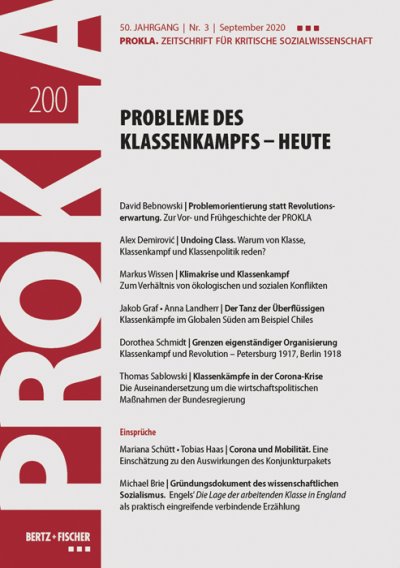Dance of the Superfluous
Class struggles in Global South – the case of Chile
DOI:
https://doi.org/10.32387/prokla.v50i200.1896Keywords:
Latin America, CHile, classes, conflictsAbstract
Chile has been experiencing a wave of social protests since October 2019. Large parts of the population joined the uprising against the »neo-liberal model« within a very short time and took part in months of struggle and processes of selforganizing. Our thesis is that these are class conflicts that differ in its form from typical struggles between capital and labour, as we usually think of them in the terms of Marx and as we know them from the global centres of the world economy. Although the considered conflicts revolve strongly around the themes of commodification and insecurity, they are not cross-class conflicts against the market in the sense of Polanyi either. Looking at the case of Chile, we rather show that class conflicts can take on their very own forms outside the narrow field of corporate conflicts, which has decisive consequences in terms of the power resources, subjects, but also potentials associated with them.
Downloads
References
Altvater, Elmar (1987): Sachzwang Weltmarkt. Verschuldungskrise, blockierte Industrialisierung, ökologische Gefährdung – der Fall Brasilien. Hamburg.
CEPAL - Comisión Económica para América Latina y el Caribe (2020): Anuario Estadístico de América Latina y el Caribe 2019. Santiago.
Díaz Andrade, Estrella / Gálvez Pérez, Thelma (2015): Informalidad laboral: más trabajadores productivos sin protección laboral. Parte 2.URL: https://www.elsiglo.cl/, Zugriff: 8.6.2020.
Fischer, Karin (2017): Clases dominantes y desarrollo desigual. Chile entre 1830 y 2010. Ediciones Universidad Alberto Hurtado. Santiago de Chile.
Fröbel, Folker / Heinrichs, Jürgen / Kreye, Otto (1977): Die neue Internationale Arbeitsteilung. Strukturelle Arbeitslosigkeit in den Industrieländern und die Industrialisierung der Entwicklungsländer. Reinbek bei Hamburg.
Fundación Sol (2019a): Los verdaderos sueldos de Chile. URL: http://www.fundacionsol.cl, Zugriff 29.5.2020.
– (2019b): Pensiones por la fuerza. URL: http://www.fundacionsol.cl/, Zugriff: 5.6.2020.
– (2020a): AFP para quién? Dónde se invierten los fondos de pensiones en Chile. Estudios de la Fundación Sol. Santiago de Chile.
– (2020b): Endeudar para gobernar y mercantilizar: El caso del CAE (2020). URL: http://www.fundacionsol.cl/wp-content/uploads/2020/05/CAE20201.pdf, Zugriff: 8.6.2020.
Galtung, Johan (1972): Eine strukturelle Theorie des Imperialismus. In: Senghaas, Dieter (Hg.): Imperialismus und strukturelle Gewalt. Analysen über abhängige Reproduktion. Frankfurt/M: 29-104.
GdCh – Gobierno de Chile (2018): Casen 2017. Síntesis de Resultados Septiembre de 2018. Trabajo. URL: http://observatorio.ministeriodesarrollosocial.gob.cl, Zugriff: 2.6.2020.
Graf, Jakob (2019): Extraktivismus im Süden Chiles: Hierarchischer Kapitalismus und territoriale Macht im chilenischen Forstsektor. Working Paper 1/2019 der DFG-Kollegforscher_innengruppe Postwachstumsgesellschaften. Jena.
Graf, Jakob / Schmalz, Stefan / Sittel, Johanna (2019): Grenzen kapitalistischen Wachstums: Sozial-ökologische Konflikte im Süden Chiles. In: Berliner Journal für Soziologie. Sonderband. 2019: 181-193.
Graf, Jakob u.a. (2020): Abhängigkeit im 21. Jahrhundert: Globale Stoffströme und internationale Arbeitsteilung. In: PROKLA 198 50(1): 11-32. DOI: https://doi.org/10.32387/prokla.v50i198.1858.
Gudynas, Eduardo (2019): Extraktivismen. Erscheinungsformen und Nebenwirkungen. In: Ramírez, Martín / Schmalz, Stefan (Hg.): Extraktivismus. Lateinamerika nach dem Ende des Rohstoffbooms. München: 19-38.
Guha, Ramachandra / Martinez-Alier, Juan (1997): Varieties of Environmentalism. London-New York.
ILO – International Labour Organization (2020): World Employment and Social Outlook Trends 2020. International Labour Office. Genf.
Julián Vejar, Dasten / Alister Sanhueza, Cristian (2018): Precaridad(es) laboral(es) en el sector forestal y maderero de la Araucanía. In: Ramírez, Martín / Schmalz, Stefan (Hg.): ¿Fin del la bonanza? Entradas, Salidas y Encrucijadas del Extractivismo. Buenos Aires: 175-192.
Komlosy, Andrea (2012): Nachholende wirtschaftliche Entwicklung. Konzepte, Beispiele und Kriterien für Erfolg oder Scheitern. In: Zeitschrift für Weltgeschichte 13(2): 11-42. DOI: https://doi.org/10.3726/84538_11.
Landherr, Anna / Graf, Jakob (2017): Neoliberale Kontinuität im politischen Wechselwind: Die Macht der besitzenden Klasse Chiles über die extraktivistische Ausrichtung des Landes. In: PROKLA 189 47(4): 569-585. DOI: https://doi.org/10.32387/prokla.v47i189.57.
Landherr, Anna (2018): El Estado de Chile y la minería: Las consecuencias internas dees extractivismo den tiempos del fin de la era del cobre. In: Ramírez, Martín / Schmalz, Stefan (Hg.): ¿Fin del la bonanza? Entradas, Salidas y Encrucijadas del Extractivismo. Buenos Aires: 125-140.
Landherr, Anna / Graf, Jakob / Puk, Cora (2019): Das Modell Chile. Die sozial-ökologischen Folgen des neoliberalen Vorzeigemodells. In: Ramírez, Martín / Schmalz, Stefan (Hg.): Extraktivismus. Lateinamerika nach dem Ende des Rohstoffbooms. München: 79-98.
Landherr, Anna / Graf, Jakob (2019): Über uns die Sintflut: Zu Klassenverhältnissen in der Internalisierungsgesellschaft am Beispiel Chiles. In: PROKLA 196 49(4): 487-493. DOI: https://doi.org/10.32387/prokla.v49i196.1839.
Lipietz, Alain (1998): Nach dem Ende des ›Goldenen Zeitalters‹. Regulation und Transformation kapitalistischer Gesellschaften. Berlin-Hamburg.
López, Figueróa, Gutiérrez (2013): La Parte del León: Nuevas Estimaciones de la Participación de los Súper Ricos en el Ingreso de Chile. Santiago.
Matamala, Daniel (2016): Poderoso Caballero. El Pe$o del dinero en la política chilena. Santiago de Chile.
Moulian, Tomás (2002): Chile actual. Anatomía de un mito. Santiago de Chile.
Oxfam (2016): Desterrados: Tierra, Poder y Desigualdad en América Latina. URL: https://www.oxfam.org, Zugriff: 2.6.2020.
Pizarro Hofer, Roberto (2020): Chile: rebelión contra el Estado subsidiario. El Trimestre Económico 87(2), núm. 346: 333-365.
Polanyi, Karl (1978): The Great Transformation. Politische und ökonomische Ursprünge von Gesellschaften und Wirtschaftssystemen. Frankfurt/M.
Saldaña, Lucía (2019): Arbeitsbedingungen, Arbeitsverhältnisse und Geschlechterungleichheit im neoliberalen Chile: Der Fall des Agrarexportsektors. In: Neuhauser, Johanna / Sittel, Johanna / Weinmann, Nico (Hg.): Arbeit und Geschlecht im Wandel. Impulse aus Lateinamerika. Frankfurt/M-New York: 153-171.
Schaffartzik, Anke / Kusche, Franziska (2020): Ökologisch ungleicher Tausch: Wachstum auf Kosten von Mensch und Natur: Nur ungleiche Material- und Geldflüsse in globalem Maßstab ermöglichen eine wachstumsorientierte Entwicklung. In: PROKLA 198 50(1): 53-67. DOI: https://doi.org/10.32387/prokla.v50i198.1854.
Schmalz, Stefan / Dörre, Klaus (2014): Der Machtressourcenansatz: Ein Instrument zur Analyse gewerkschaftlichen Handlungsvermögens. In: Industrielle Beziehungen 21(3): 217-237. DOI: https://doi.org/10.1688/IndB-2014-03-Schmalz.
Schmalz, Stefan (2016): Weltsystemanalyse. In: Fischer, Karin u.a. (Hg.): Handbuch Entwicklungsforschung. Wiesbaden: 55-66. DOI: https://doi.org/10.1007/978-3-658-04790-0_5.
Silver, Beverly (2003): Forces of Labour. Arbeiterbewegungen und Globalisierung seit 1870. Hamburg 2005.
Svampa, Maristella (2019): Las fronteras del neoextractivismo en América Latina. Conflictos socio-ambientales, giro ecoterritorial y nuevas dependencias. Bielefeld.
Tauss, Aaron / Boos, Tobias (2020): Insurrektion und Protest: Die Mobilisierungen in Ecuador, Chile, Bolivien und Kolumbien 2019. In: PROKLA 199 50(2): 373-393. DOI: https://doi.org/10.32387/prokla.v50i199.1869.
Wallerstein, Immanuel (1979): Aufstieg und künftiger Niedergang des kapitalistischen Weltsystems Zur Grundlegung vergleichender Analyse. In: Senghaas, Dieter (Hg.): Kapitalistische Weltökonomie Kontroversen über ihren Ursprung und ihre Entwicklungsdynamik. Frankfurt/M.: 31-67.






